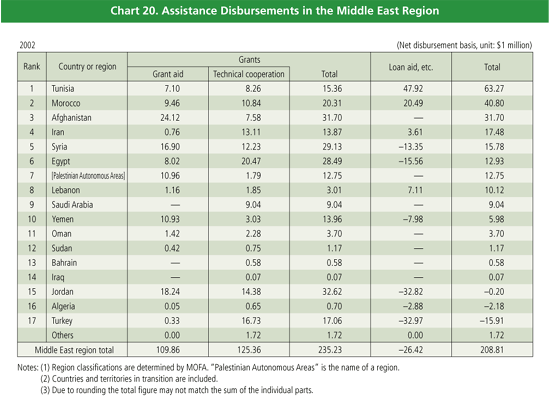

| Part III. | ODA DISBURSEMENTS IN FISCAL YEAR 2002 |
Japan’s bilateral ODA to the Middle East region in 2002 was
approximately $210 million, 3.1% of total bilateral ODA.
Japan has been carrying out assistance in the Middle East region placing importance
on the following points, as stated in the medium-term policy.
| (1) | Japan will provide support for the Middle East Peace Process (through assistance to the Palestinians as well as to neighboring Arab countries and support for initiatives related to multilateral negotiations, etc.). |
| (2) | In relatively low-income countries, Japan will provide support for social and economic infrastructure development, including agricultural and water-resources development. |
| (3) | In the relatively high-income Gulf States, Japan will provide technical cooperation for the training and education of domestic engineers for the achievement of economic diversification and the development of non-petroleum sectors and provide appropriate support for the development of a favorable environment for attracting foreign investment. |
| (4) | Japan will provide support for environmental conservation measures in relatively high-income countries and other countries as well. |
Japan imports approximately 86% of its crude oil from the Middle
East region and is also one of the most important trading partners for many
of the countries in this region, and there is therefore an extremely high level
of interdependence between Japan and the Middle East region. The region, though,
contains a number of destabilizing factors relating to the Middle East Peace
Process and the situation in Afghanistan and Iraq, etc. and some non-oil-producer
countries face economic difficulties like international balance-of-payments
deficits and cumulative debt. Furthermore, since the September 11 terrorist
attacks, it has become even more important than ever to avoid instability in
this region. For these reasons, Japan attaches priority to assistance for maintaining
harmonious trade relations with this region and achieving social stability and
peace in the region through ODA.
For countries whose development is relatively lagging behind, Japan is implementing
support mainly through grant aid for socio-economic infrastructure development,
such as development of medical facilities and medical equipment, development
of educational facilities, rural development, water resources development, etc.
Examples of this kind of support include the “Project for Expansion of
Tuberculosis Control in the Southern Governorates” in Yemen and the “Project
for Improvement of the Water Supply System for the Zarqa District” in Jordan.
And Japan is actively making efforts to reduce poverty through human resources
development in the agriculture, forestry and fishing industries, health and
medical services, and water resources development sectors by implementing assistance
focused on technical cooperation such as the “Family Planning and Women
in Development (WID) Project, Phase 2 (2001–2003, technical cooperation
project).”
For countries whose development is relatively advanced, Japan is making efforts
to develop socio-economic infrastructure to reduce poverty and regional disparities,
to provide support for economic diversification through the promotion of information
technology (IT) and industrial development, etc. and to develop human resources
in sectors such as environmental conservation, etc.
Japan provided ODA loans to Morocco and Tunisia in fiscal year 2002. These projects
provided support considered direct poverty reduction through social infrastructure
development. For Morocco Japan approved the provision of financing for the “Rural
Electrification Project (II).” This project is going to develop an electricity
grid for approximately 88,000 households in the seven provinces in Morocco with
an especially large poor population and it is expected to improve the living
environment, revitalize the village economy, etc. and reduce regional disparities.
For Tunisia Japan approved the provision of financing for the “Rural Water
Supply Project (II)” and is supporting the construction of rural water
supply facilities and the procurement of pumps, water pipes, etc. for approximately
100 of the poorest counties (délégations).
Refer to Part I for details about support for
Afghanistan.
| |
Support for Middle East Peace |
On the occasion of the visit of Minister for Foreign Affairs
Yoriko Kawaguchi to Israel and the Palestine Autonomous Areas in June 2002,
she proposed the “Road-map for Japan’s Assistance to Palestinians”
to the Palestinian Authority based on the concept of advancing assistance as
progress toward peace is made. Based on this “Road-map” Japan has
been promoting efforts toward peace and providing support for “nation-building”
to establish an independent Palestinian state and in the governance sector for
Palestinian Authority reform. As a result, Japan’s bilateral ODA and assistance
through international organizations for Palestine amounted to approximately
$18.53 million in 2002. From 1993 to December 2002 Japan provided support of
more than $630 million to Palestine. From the perspective of the stability of
the Middle East region, Japan has provided support through financial cooperation
and technical cooperation in a variety of sectors for the Arab countries participating
in the Middle East Peace Process, namely Egypt, Syria, Jordon, and Lebanon.
 |